A Series of Unfortunate Incidents: An interview with Caustic Casanova
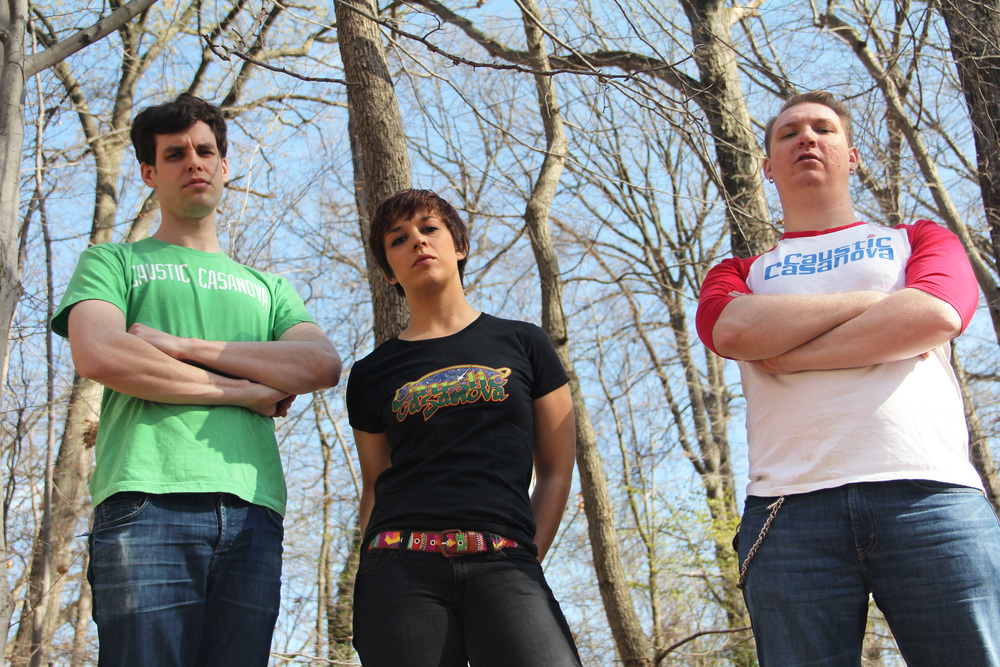
Caustic Casanova is a loud, heavy rock trio from Washington, DC. The CC, as they are affectionately known by their fans, has been tearing up stages and studios alike with their unique brand of eclectic, “absurdly muscled uber-psyche” (Indy Week) since their inception on the campus of The College of William & Mary in Williamsburg, Virginia in 2005. In 2008 CC released their first ever full-length studio album, a fourteen song, seventy-two minute tour-de-force entitled Imminent Eminence. Four years later, Caustic Casanova unleashed 2012’s critically acclaimed Someday You Will Be Proven Correct, produced by J. Robbins.
After the release of Someday You Will Be Proven Correct and a 2012 SXSW tour came the departure the group’s original guitarist, and a most critical juncture for the rhythm section of the band – whether to continue as Caustic Casanova, start another project, or part ways altogether. After much deliberation, drummer/vocalist Stefanie Zaenker and bassist/lead vocalist Francis Beringer decided to honor the work they’d done over the years together by continuing Caustic Casanova.
Months of experimenting as a bass and drums two piece were followed by rounds of guitar player auditions, finally yielding the missing element to the new Caustic Casanova, longtime fan, friend and all-around six string wizard Andrew Yonki. In Andrew’s two and a half years with the band, the rejuvenated Caustic Casanova has gigged wherever and whenever possible, embarked on two lengthy national tours and several shorter ones, and has earned a much bigger following in DC.
In 2014 Caustic Casanova signed to Retro Futurist Records after opening for psych metal veterans and label owners Kylesa, and later teamed up with J. Robbins to record lots of new music and release the first in a series of 7-inch singles called Pantheon: Volume 1. Despite losing Stefanie for nearly half the year to severe wrist injuries from a life threatening accident (once again putting the very existence of the band in jeopardy) Caustic Casanova returned stronger, tighter and more motivated than ever to build sonic temples in which to worship feedback, massive riffs, delay pedals, bass fuzz, thunderous drum fills and soaring vocal melody.
The end product of these years of writing and recording through trial and tribulation is Caustic Casanova’s new album and Retro Futurist debut Breaks, once again produced by J. Robbins. Breaks features seven unconventional and melodic heavy rock songs, none quite like the other, and covers a vast sonic territory from dark, driving post-punk to psychedelic post-metal, from heavy doom blues to epic space rock and everything in between. Breaks will be released on September 25, 2015. Look for Caustic Casanova on tour in the U.S. during August, October and November.
Ghettoblaster recently caught up with the band to discuss DC’s musical legacy, hooking up with Kylesa and Retro Futurist, and working the J. Robbins
Are you from D.C. originally, or are you transplants? Has the area’s musical legacy influenced the music that you make?
Andrew Yonki: I grew up in New Jersey,and came to DC in 2004 to go to American University. I was a music nerd growing up, so I was well aware that DC had such a storied musical history, and I prepared for my arrival by looking at the Dischord records website to see if any of the bands were playing at the time I’d arrive.
The musical legacy of DC is most influential in that, no matter what the sociopolitical message of the bands were, or whether they always adhered to the DIY ethos, the fact was that the bands from this city have been really fantastic, no matter the genre. So many bands from here have forged their own sonic identity, and I aspire to that. Whatever the “it” factor is about bands from this city, I’m a fan of it and I hope to have left my mark on it.
Stefanie Zaenker: I grew up in Charlottesville, Virginia. I moved to DC in 2008 right after I graduated from William and Mary. I am a big fan of the music that has come out of DC, especially the DC hardcore and go go scenes. I became aware of bands like Bad Brains, Minor Threat, Government Issue, etc in college but it wasn’t until I moved here to and got involved in the current music scene that I realized how much of an impact it had on so many bands, particularly starting the do-it-yourself model for carving out a life for yourself in music.
I’d say the raw energy of live performances and the DIY ethos of the hardcore and punk scenes has influenced us the most. Plus I’ve been playing around with some go go beats at practice so we can incorporate that into a song or two somehow.
Francis Beringer: I am from Arlington, and I went to high school in DC. I’ve lived other places but spent most of my life in DC. The modern musical legacy of Washington is go-go and DC hardcore, and I would be lying if I said either of those two have had a huge influence on my songwriting in particular.
The legacy of Washington’s punk rock musical culture that emphasizes the importance of DIY and creating your own musical identity is certainly not lost on me or my bandmates, and certainly there’s an element of living here and being part of said culture that has kept us going for all these years, literally always doing it ourselves.
More recently, bands like Jawbox and Fugazi have become an influence in my writing, and they’ve always been an element of Andrew’s playing, so that wiry, dissonant, challenging and aggressive post hardcore guitar is now a part of our sound to some degree. Some of the things we’re working on now (for the next record) and a song that was left off Breaks (which will appear on an EP down the road) both prominently showcase a DC post hardcore influence, particularly on guitar.
You worked with J. Robbins on Someday You Will Be Proven Correct. What was that experience like?
SZ: It was wonderful. J is just the best. As an engineer and producer he has the perfect combination of knowledge and expertise, approachability, patience, and ability to understand what we’re trying to do with a certain part or song and then make interesting new suggestions that we hadn’t thought of.
He pushes us to be our best and his attention to detail does not go unnoticed, and really makes a difference once the mix is done. He’s also a great conversationalist and is full of great tour stories.
FB: It was an extremely important part of my development as a musician, and Caustic Casanova was forever changed by that experience. We made a great record with a great record producer who is also a legendary musician and has outstanding taste – it would be difficult to create a better situation for us at that time.
J was such a joy to work with. He held our hand in areas where we were green or inexperienced, and got out of our way when we were on a roll. Almost every instinct he has as a producer is good.
Making a great record, especially a great sounding record, is all about small choices – it’s that extra five percent that only true experts know that creates a truly special record (this is assuming the band is tight and the material is strong). It’s tiny changes in mic placement, refining a drum part down to its most accurate detail, bringing out a leslie speaker for a guitar solo and tuning drums for four hours – these little things make a massive difference when added up at the end.
Some of these changes – their purpose and what difference they’re making are often not perceivable to me while they’re happening. Only when the finished product comes out do I fully comprehend some of those choices and ideas. That’s where J really shines – in the small places where the greatest care must be taken.
Your original lead guitarist left the band in 2012, right? How did you regroup and recover from that?
FB: It is easy now to look at that time through rose colored glasses and forget how difficult it was. It was entirely conceivable to me at that time that Caustic Casanova was finished. A big part of me did not think replacing Michael would be possible. Michael also sang lead and wrote a lot of songs, and CC had started as our project when we were teenagers. The new band would have to be worthy of the Caustic Casanova name and musical output – otherwise, there was no point in my mind. The new guitar player was going to have enormous shoes to fill.
Stefanie’s confidence in us and her resiliency kept me going through that difficult time. She was sure we would find someone else, regroup and retool and come out successful. She was right. After a bunch of guitar player auditions, we decided on Andrew, our longtime friend. He’s been as close to perfect for the role as we could have imagined anyone being, as a musician and person. It helps a lot that the three of us are all such close friends.
What has Andrew brought to the band that has transformed it?
AY: My guitar playing style, as well as my listening habits, is very steeped in in-your-face punk rock, hardcore, and heavy metal styles. I think overall the band has gotten heavier, as me and Francis first bonded over our mutual love of stoner metal and our love of heavy music has been at the forefront of our friendship for the past six and a half years, and the first times we ever played together just involved us improvising doom metal on a Saturday night over a twelve-pack of beer.
I didn’t turn the band into a metal band, but I do think that, between my playing, songwriting influences, and the guitar tone that I use, the sound of the band has gotten thicker and heavier and darker in a lot of ways.
SZ: A lot of jokes, bird noises, and stretch breaks. And accents. Sometimes it feels like we’re a ten person band. In all seriousness though, he has brought a generally heavier and more psychedelic sound to Caustic Casanova. He has a lot of different pedals and loves experimenting with them. My favorite of them is the blue box.
He has brought great friendship and dedication, a lot of laughs, serious guitar chops, a love of pedals, and a willingness to push the boundaries of whatever anyone might think traditional heavy rock music is. He’s always willing to rework something and is constantly self editing. He’s a just a fantastic musician with an ear for a great riff.
FB: Andrew brought his own set of influences from punk and metal to our band. We are a heavier band because of him, and that’s the direction I wanted to go in anyway so it worked out perfectly. He brings a different way of looking and things and a different way of working. He’s a constant burst of guitar creativity, and he’s willing to try just about any idea I have for an arrangement, and he can usually execute exactly what I hear in my head or improve upon it. He also is a phenomenal musician, who, like me, loves an awesome riff. He can easily learn a song with 13 crazy riffs in a couple practices. He’s also a great streamliner and editor – his songwriting vision is strong. It’s really exciting having him in the band.
How did you meet Kylesa?
FB: We opened for them with a 25 minute set in October 2013 at a now defunct venue called Empire in Springfield, VA. Most of DC’s clubs do not (which I do not understand) give out many opportunities to local bands. It’s a very small club of area bands that gets to open for national acts, and we are not in that club. Never in a million years would we open for Kylesa in DC, under any circumstances. Even asking would be laughable.
When we saw they were coming to Empire, we just wanted a chance to play with one of our favorite bands, and a band that we thought might just get where we’re coming from. We betrayed our principles and sold tickets and participated in this noxious pay-to-play racket in order to have this fun opportunity. It was a great show and I’ll never forget it. Kylesa destroyed, as usual
When did they approach you about releasing your record via Retro Futurist?
SZ: We all talked to Phil or Laura that night after we opened for them and in one of those convos, I believe it was even on stage as they were breaking down gear and loading out, Phil offered to put out our next record if we didn’t already have something lined up, just based on our performance that night. They bought our most recent LP at the show and apparently really enjoyed it because we all stayed in touch in the following months and the record deal materialized from there.
Stefanie also suffered a severe wrist injury that put the existence of the band in jeopardy, right? How did that happen and how did she recover from that?
SZ: I broke both of my wrists and tailbone on Christmas Eve in 2013. I fell from a pretty tall height, so I consider myself pretty lucky that it wasn’t worse. It all happened so fast and the first couple days in the hospital were just a blur of surgeries and pain meds that it took a few days to really sink in that I might never play drums again. That might sound a bit dramatic, but I had never broken a bone before so I really had no idea what to expect in terms of the recovery process.
After two surgeries that both went really well my doctors said if I worked my butt off in the coming months of physical therapy I’d probably get 95 percent mobility back. It was incredible hearing them say that so I just put my game face on and was a beast at outpatient and home physical therapy for a few months.
I just focused on staying positive, learning from the experience, and working as hard as I possibly could on my therapy. I was able to play drums again at the end of March 2014. It was just the most triumphant and gleeful feeling when I sat on my throne for the first time expecting to be able to play for a couple minutes and ended up finishing an entire two hour band practice.
Andrew and Fran just continued working on stuff together while I was staying with my parents in Charlottesville during recovery. I told them to operate under the assumption that I’d be back at it in a few months, and they did, so we really only ended up taking a few months off as a full band. They were incredibly supportive of me throughout the whole experience and I really couldn’t ask for better band mates or friends.
When did you begin writing Breaks and what were you hoping to accomplish with that?
FB: Our former guitar player had been living in Boston for a while and commuting once in a while to DC for gigs and the occasional practice. Without him around much, Stefanie and I grew bored and began to jam a lot as a duo. Four of the songs on the record come from those jams, which started as early as 2011. The only thing we were trying to accomplish then, as now, was to write the best rock songs we can.
AY: Fran and Stefanie started writing the material that would become “Breaks” in I’m guessing 2010, 2011, right around the time that Michael first moved away from the DC area. They’d written enough that, in October 2012, they’d recorded a demo with four mostly-complete new songs. For me personally, I wanted to make a killer guitar rock record. I wanted big riffs, big power chords. I wanted to do really unique things on the guitar and really challenge myself on textures and atmosphere.
SZ: Musically speaking the album is heavier than 2012’s Someday You Will Be Proven Correct. We wanted to challenge ourselves by writing more complex material and make a better record than ‘Someday’ (a record we are definitely proud of, though). We all really like pushing ourselves to be better musicians and we are constantly trying to find new and creative ways to write songs, rearrange certain parts, or do something none of us have heard before. We don’t really abide by any established songwriting rules so we were just aiming for something that sounded heavy, unique, and interesting to all of us.
We also added a lot more dual lead vocals with Francis and I, and a lot more of my backing vocals, so that brought something unique into the mix that’s not often something you hear with heavy bands.
Is there a theme or idea that you were hoping to capture with the record?
SZ: Lyrically speaking there is no main theme or idea, other than our observations and musings on the current state of affairs: sometimes personal, sometimes political, sometimes social. Fran has become a great lyricist and he’s great at conveying attitudes or beliefs the three of us hold. Hopefully our commitment to and love of making interesting music, our senses of humor, and the introspection that comes with having had a lot of life experiences will come across on “Breaks.”
AY: Big riffs, emotional catharsis, psychic journeys, rock and fucking ROLL.
You went back to J. Robbins for Breaks. Did he bring anything to the table that surprised you this time around?
FB: I’m not sure we were surprised by anything. At this point we’re friends with a solid working relationship. Personally, I feel like I’ve grown more as a musician and thus am able to get more out of the studio. I know more of what I’m looking for when mixing. I know what exactly I’m messing up when playing bass that J is trying to get me to correct.
The record sounds so good – I had pages and pages of notes for J with audio samples for all sorts of things, and we went over all of it in great detail. With Someday, I felt like an impostor in the mixing room – consequently I didn’t speak up much. I felt totally comfortable making this record, and especially comfortable mixing it with J and picking it apart.
You’ll be touring fairly extensively in support of Breaks. What destinations are you most excited to visit?
AY: Name a place I haven’t been and that’s the place. Also Seattle. And the Bay Area if we go back there. And San Diego. Fran owes me fish tacos and a Tecate tall boy.
SZ: This will be our longest tour to date. We’ve gone out for a little over a month before but we’re in the middle of planning a five or six week tour for October/November now, in support of Breaks. I just love touring and seeing new parts of the country. I had never seen any of the Southwest before our Summer 2013 tour and I just fell in love with the Arizona and New Mexico landscapes. I grew up on the east coast so I was used to hilly, arboraceous environs with cities pretty close together and easy to get to. The vastness, colors, and just mysterious and awe-inspiring beauty of the southwest really stood out to me so I’m excited to go back to that part of the country. I almost felt like I was on another planet. I’d love to visit Death Valley – and always any city on the coast with a good beach.
FB: I love visiting San Diego because I used to live there. I’m really excited to see friends in Seattle. I love the American southwest, so New Mexico and Arizona are always fun for me. We really enjoyed St. Petersburg, Florida, last time around and hope to get back there. Obviously, Savannah being the home of Retro Futurist and Kylesa will make any show there memorable.
(Visit Caustic Casanova here: http://causticcasanova.com/.)


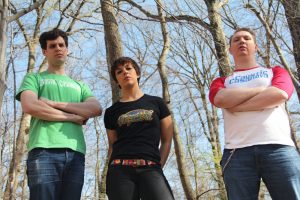
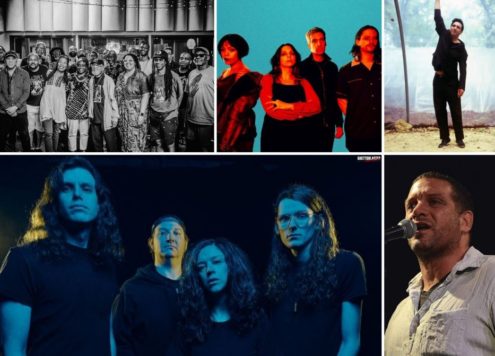
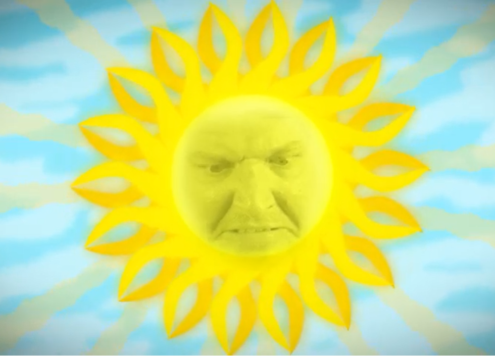
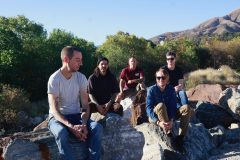
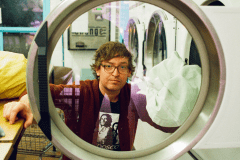
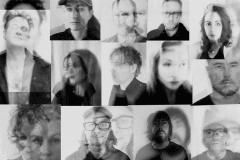
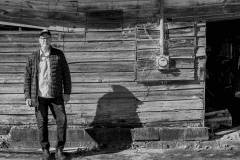

Social Media